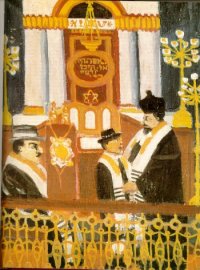 Think: Bar Mitzvah! On one hand, you have months and months of preparation and learning and reciting and singing your Torah and Haftorah portion and the accompanying prayers. On the other hand, there’s this great party afterwards, with flashing color lights, kids and adults dancing alike, neon tube necklaces and inflatable musical instruments! But there’s much more to a Bar Mitzvah than reciting Hebrew and partying into the wee hours of morning.
Think: Bar Mitzvah! On one hand, you have months and months of preparation and learning and reciting and singing your Torah and Haftorah portion and the accompanying prayers. On the other hand, there’s this great party afterwards, with flashing color lights, kids and adults dancing alike, neon tube necklaces and inflatable musical instruments! But there’s much more to a Bar Mitzvah than reciting Hebrew and partying into the wee hours of morning.
Literally, the term “Bar Mitzvah” means “son of the commandment.” The same is true for “Bat Mitzvah,” meaning “daughter of the commandment.” The Bar Mitzvah ceremony celebrates a child’s entry into adulthood by Jewish tradition. According to the Talmud, when a boy becomes 13 or a girl becomes t2, they both are now adults. In fact, no ceremony is needed. It’s much like with U.S. law, when you become 18, you gain the full rights of an adult. You don’t need a ceremony for that. However, it is an important time in a Jew’s life.
In the Jewish sense, when one reaches the age of Bar/Bat Mitzvah, that’s the end of their childhood. As a Jewish adult, one is responsible for their religious and personal privileges. One can now be counted toward the minyan, the number of people required for a prayer (often ten). One can now go up to the bimah for an allyah, and traditionally, one is now obligated to wear their tallit and tefillin. Fasting on Yom Kippur is required, and your oath of Jewishness is binding and everlasting.

The cornerstone of a Bar/Bat Mitzvah ceremony is reading from the Torah. Only Jewish adults are allowed to read from the Torah, and it is indeed a great privilege to do so. Reading from the Torah can require as much at a year’s practice (when added with the several other prayers the participant has to recite), but the rewards are everlasting. It is also customary for the Bar/Bat Mitzvah to give a speech relating to issues that concern him/her to the whole synagogue, and to prove that they are now an Jewish adult, capable of participating fully in society.
Being a Bar/Bat Mitzvah doesn’t necessarily mean that you’re an adult, all-knowing and all-responsible for everything. The ceremony only marks the crossing of the threshold, and the beginning of one’s evolution into a person with certain responsibilities and moral obligations to themselves, their family, their community, as well as the rest of the world. Obviously, filling this role doesn’t happen all at once. Intellectual and spiritual maturity is a process that takes time and experience, and that process is never-ending.
The Bar/Bat Mitzvah ceremony isn’t alone in the technicolor rainbow of religion. Many ancient and modern civilizations celebrate the rite of passage from childhood to adulthood. This was and is a means of perpetuating the community by which one becomes a citizen and adult and caregiver of that community.
So, where did the Bar Mitzvah come from? Historically, it probably originated as a type of an initiation rite in ancient times. Biblically, it was at the age of thirteen that a male began to acquire the faculty for sound reasoning and good judgement, as well as the ability to control his desires. In the Bible, it was at thirteen that Abraham rejected his father’s idols, and that Jacob and Esau went their separate ways – Jacob to study Torah, Esau to worship idols.
Having a Bar/Bat Mitzvah doesn’t mean that you have to do it in a synagogue. Based on your values, you car have the ceremony in your home or at a retreat as long as you have a minyan and a Torah. You can have it on Monday, Thursday or Shabbat or Holidays when we read the Torah. An option increasing in popularity is making a pilgrimage to Israel and celebrating their Bar/Bat Mitzvah at the Western Wall, in a Jerusalem synagogue or atop Masada.

In addition to new locations, new people are having Bar/Bat Mitzvahs. Even more than before, adults are studying Torah and performing their own Bar/Bat Mitzvah ceremony. Converted Jews and people that did not or could not have the opportunity for a Bar/Bat Mitzvah ceremony are doing it later in their lives.
Beginning around the 1920’s, female Jews also.have been performing their own Bat Mitzvah ceremonies. Before that, girls were limited in their Jewish education because they were encouraged to perform the female religious obligations of tending to home and family. In fact, women had Bat Mitzvahs as long ago as the fourteenth century, but in recent times with changing attitudes, it is now commonplace for girls to participate fully in the Bat Mitzvah ceremony as boys in their Bar Mitzvah.
Not everyone has to have a Bar/Bat Mitzvah – they become adults automatically. But it’s a custom to celebrate that occasion in some way. But it’s not all about getting presents – it’s about demonstrating your responsibility and claiming your right to take your place in society. That’s what everyone learns on the journey from childhood to adulthood and beyond.




